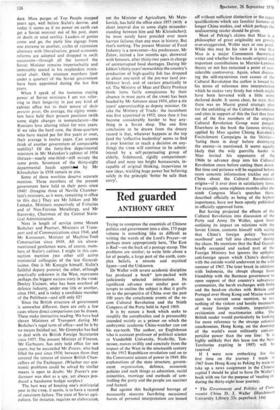Red guarded
ANTHONY GREY
Trying to compress the essentials of Chinese politics and government into a slim, 175-page volume is something like as difficult as writing the words of the Lord's Prayer—or perhaps more appropriately here, 'The East is Red'—on the back of a postage stamp. The problems are similar; to write little about a lot of people, a large part of the earth, com- plex beliefs, a remote and mystical figure—and the Unknown.
Dr Waller with severe academic discipline has produced a book* jam-packed with judiciously selected information. Its significant advance over similar past at- tempts to outline the subject is that it grafts on to the perspective of China over the past 100 years the cataclysmic events of the re- cent Cultural Revolution and the Ninth Congress of the Party held in April 1969.
It is by nature a book which seeks to simplify the complexities and is presumably intended mainly as a primer on which the embryonic academic China-watcher can cut his eye-teeth. The author, an Englishman who is assistant professor of political science at Vanderbilt University, Nashville, Ten- nessee, moves swiftly and concisely from the impact of the West in the nineteenth century to the 1912 Republican revolution and on to the Communist seizure of power in 1949. His explanations of the state structure, govern- ment organisation, defence, economic policies and such things as education, racial minorities, marriage and methods of con- trolling the party and the people are succinct and factual.
But against this background barrage of necessarily staccato fact-firing occasional bursts of personal interpretation are loosed off without sufficient distinction or the cagey qualifications which are familiar features of longer China studies, and which perhaps the undiscerning reader should be given.
Most of Peking's claims that Mao is a philosopher of great originality are grossly over-exaggerated, Waller says at one point. While this may be his view it is true that Mao is a major Communist theoretical writer and whether he has made original and important contributions to Marxist-Leninist theory or not has remained a point of con- siderable controversy. Again, when discuss- ing the still-mysterious root causes of the Cultural Revolution the author is forced by his terms of reference into interpretation which he makes very firmly but which might have been leavened with a little more declared doubt. It seems clear, he says, that there was no Maoist grand strategic plan for the unfolding of the Cultural Revolution and cites in support of this the fact that four out of the five members of the original Cultural Revolution Group were purged. Elsewhere in the book the famous strategy applied by Mao against Chiang Kai-shek's Encirclement Campaigns in the 'thirties— 'luring them in deep' before destroying the enemy—is mentioned. It seems equally likely that the wily guerrilla leader in Mao invited his opponents of the 1960s to advance deep into his Cultural Revolution snare before cutting them down. But time and patience will be required before more concrete information trickles out of China about the Cultural Revolution's origins—if it ever does in satisfactory form. For example, some eighteen months after the ninth Congress Mao's speeches there, described officially as being of the highest importance, have not been openly published in officially approved form.
But having projected the effects of the Cultural Revolution into discussion of the Party and Army Dr Waller, apart from outlining its impact on relations with the Soviet Union, contents himself with saying that China's foreign policy 'became moribund' and 'fell into abeyance' during the chaos. He mentions that the Red Guards briefly occupied and sacked part of the Foreign Ministry but ignores the epileptic anti-foreign spasm which China's dealings with the outside world underwent in the wild summer of 1967. The later break in relations with Indonesia, the abrupt change from friendship with the Burmese government to open support of that country's subversive communists, the harsh exchanges with India and the head-on clashes with Britain and Portugal over Hong Kong and Macao would seem to warrant some mention, to say nothing of the violent and hostile treatment of many foreign residents, imperialists, revisionists and reactionaries alike. The British reader would particularly be looking for more reference to the strange colonial anachronism, Hong Kong, on the doorstep of the world's most militantly anti-im- perialist power than the one line: 'It is highly unlikely that this lease (on the New Territories expiring in 1997) will be renewed.'
If I were now embarking for the first time on the journey I made in 1967 from Hong Kong to Peking by train to take up a news assignment in the Chinese capital I should be glad to have Dr Waller s. book with me for the purpose of 'reading in' during the thirty-eight hour journey.
* The Government and Politics of Com- nmnist China D. J. Waller (Hutchinson University Library 33s paperback 14s)


































 Previous page
Previous page